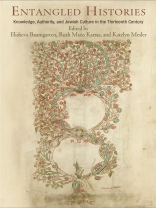From Halakhic innovation to blood libels, from the establishment of new mendicant orders to the institutionalization of Islamicate bureaucracy, and from the development of the inquisitorial process to the rise of yeshivas, universities, and madrasas, the long thirteenth century saw a profusion of political, cultural, and intellectual changes in Europe and the Mediterranean basin. These were informed by, and in turn informed, the religious communities from which they arose. In city streets and government buildings, Jews, Christians, and Muslims lived, worked, and disputed with one another, sharing and shaping their respective cultures in the process. The interaction born of these relationships between minority and majority cultures, from love and friendship to hostility and violence, can be described as a complex and irreducible 'entanglement.’ The contributors to Entangled Histories: Knowledge, Authority, and Jewish Culture in the Thirteenth Century argue that this admixture of persecution and cooperation was at the foundation of Jewish experience in the Middle Ages.
The thirteen essays are organized into three major sections, focusing in turn on the exchanges among intellectual communities, on the interactions between secular and religious authorities, and on the transmission of texts and ideas across geographical, linguistic, and cultural boundaries. Rather than trying to resolve the complexities of entanglement, contributors seek to outline their contours and explain how they endured. In the process, they examine relationships not only among Jewish, Christian, and Muslim communities but also between communities within Judaism—those living under Christian rule and those living under Muslim rule, and between the Jews of southern and northern Europe. The resulting volume develops a multifaceted account of Jewish life in Europe and the Mediterranean basin at a time when economic, cultural, and intellectual exchange coincided with heightened interfaith animosity.
Contributors : Elisheva Baumgarten, Piero Capelli, Mordechai Z. Cohen, Judah Galinsky, Elisabeth Hollender, Kati Ihnat, Ephraim Kanarfogel, Katelyn Mesler, Ruth Mazo Karras, Sarah J. Pearce, Rami Reiner, Yossef Schwartz, Uri Shachar, Rebecca Winer, Luke Yarbrough.
Spis treści
Introduction
—Elisheva Baumgarten, Ruth Mazo Karras, and Katelyn Mesler
PART I. INTELLECTUAL COMMUNITIES AND INTERACTIONS IN THE LONG THIRTEENTH CENTURY
Chapter 1. Rabbinic Conceptions of Marriage and Matchmaking in Christian Europe
—Ephraim Kanarfogel
Chapter 2. Nahmanides’ Four Senses of Scriptural Signification: Jewish and Christian Contexts
—Mordechai Z. Cohen
Chapter 3. Bible and Politics: A Correspondence Between Rabbenu Tam and the Authorities of Champagne
—Rami Reiner
Chapter 4. Rabbis, Readers, and the Paris Book Trade: Understanding French Halakhic Literature in the Thirteenth Century
—Judah Galinsky
PART II. SECULAR AND RELIGIOUS AUTHORITIES
Chapter 5. The Madrasa and the Non-Muslims of Thirteenth-Century Egypt: A Reassessment
—Luke Yarbrough
Chapter 6. Jews in and out of Latin Notarial Culture: Analyzing Hebrew Notations on Latin Contracts in Thirteenth-Century Perpignan and Barcelona
—Rebecca Winer
Chapter 7. From Christian Devotion to Jewish Sorcery: The Curious History of Wax Figurines in Medieval Europe
—Kati Ihnat and Katelyn Mesler
Chapter 8. Nicolas Donin, the Talmud Trial of 1240, and the Struggles Between Church and State in Medieval Europe
—Piero Capelli
PART III. TRANSLATIONS AND TRANSMISSIONS OF TEXTS AND KNOWLEDGE
Chapter 9. Cultural Identity in Transmission: Language, Science, and the Medical Profession in Thirteenth-Century Italy
—Yossef Schwartz
Chapter 10. Matter, Meaning, and Maimonides: The Material Text as an Early Modern Map of Thirteenth-Century Debates on Translation
—S. J. Pearce
Chapter 11. Pollution and Purity in Near Eastern Jewish, Christian, and Muslim Crusading Rhetoric
—Uri Shachar
Chapter 12. Adoption and Adaptation: Judah ha-Levi’s ציון הלא תשאלי לשלום אסיריך in Its Ashkenazic Environment
—Elisabeth Hollender
Notes
List of Contributors
Index
Acknowledgments
O autorze
Elisheva Baumgarten is Professor Yitzhak Becker Chair of Jewish Studies and Professor of Jewish History and History at the Hebrew University of Jerusalem and author of Practicing Piety in Medieval Ashkenaz: Men, Women, and Everyday Religious Observance, available from the University of Pennsylvania Press. Ruth Mazo Karras is Professor of History at the University of Minnesota. She is author of Unmarriages: Women, Men, and Sexual Unions in the Middle Ages and From Boys to Men: Formations of Masculinity in Late Medieval Europe, , and coeditor of Law and the Illicit in Medieval Europe, all available from the University of Pennsylvania Press. Katelyn Mesler is a postdoctoral fellow at the Westfalische Wilhelms-Universitat in Munster.












